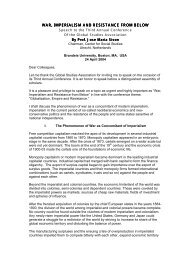INFO TECH MERGERS AND GLOBALIZATION BY JERRY HARRIS ...
INFO TECH MERGERS AND GLOBALIZATION BY JERRY HARRIS ...
INFO TECH MERGERS AND GLOBALIZATION BY JERRY HARRIS ...
You also want an ePaper? Increase the reach of your titles
YUMPU automatically turns print PDFs into web optimized ePapers that Google loves.
The new rules of global competition were in play when Britain’s Vodafone Airtouch took over<br />
Germany’s Mannesmann to create the largest wireless telephone corporation in the world. Not<br />
only will the new company control the biggest Euro markets in Britain, Germany and Italy, it<br />
will have holdings in more than 30 countries including the U.S. and Japan. Europe shares a<br />
common wireless transmission standard, so mobile phone use is much more widespread than in<br />
the U.S. The Vodafone/Mannesmann merger also has huge implications for internet users,<br />
because throughout Europe personal computer access to the net is limited and expensive. In<br />
achieving a monopoly over wireless communication, Vodafone is now in the position to be the<br />
largest Internet portal in Europe.<br />
The takeover of Mannesmann reveals the fierce competition that goes on between transnationals.<br />
Both corporations tried to gain advantage by moving directly into the other’s market. In January<br />
’99 Vodaphone acquired Airtouch in the U.S., an important minority partner of Mannesmann.<br />
Mannesmann fought back by entering the British market when it bought out the large mobil<br />
phone network, Orange, for $33 billion in October ’99. When Vodafone stoled away another<br />
Mannesmann partner, this time in an internet deal with Vivendi in France, they had finally<br />
manuvered into a dominant competitive position.<br />
Although both corporations had strong domestic identities their respective governments steered<br />
clear of being drawn into a nationalist brawl.<br />
Even as Mannesmann was threatened by a hostile foreign takeover, Chancellor Gerhard Schroder<br />
judged government interference could jeopardize future mergers in which German corporations<br />
would continue their global integration. The acquisition of Chrysler by Damiler Benz has marked<br />
the road forward for German transnationals. In fact, Damiler Benz’s future buy-out of Citroen<br />
Puegot in France is already rumored.<br />
To think of the English, Germans, or any national group as winners in these mergers is to miss<br />
their essential character as transnational deals engineered by de-nationalized elites. Global<br />
markets are transforming national capitalists into a transnational class with common goals and<br />
interests. Mannesmann’s CEO, Klau Esser, a member of the new global class declined to use<br />
nationalist political rhetoric as a strategy to defend his corporation. Although most Geman<br />
investors opposed the deal, Esser ignored his domestic audience and appealed to his global<br />
shareholders to hold out for a higher share price. When Vodafone upped their offer, the majority<br />
of shareholders bought the deal. Esser understood that the question over which partner would<br />
dominate the deal was a secondary consideration to building a new transnational giant and<br />
allowed the process to unfold.<br />
Mannessmann may have had a German face, but in reality it was already a thoroughly<br />
transnationalized corporation with many institutional investors in the U.S. and Britain. Not only<br />
was there substainal foreign holdings in Mannesmann, but the corporations also owned U.S.<br />
interests in phone, publishing, and music. If you swoon to Whitney Houston or groove to<br />
Santana you’ve been listening to a Mannesmann CD.<br />
The Vodafone/Mannessmann merger illustrates important features of the new capitalist order. In<br />
particular, the elevation of international stock prices over domestic concerns underscores how



